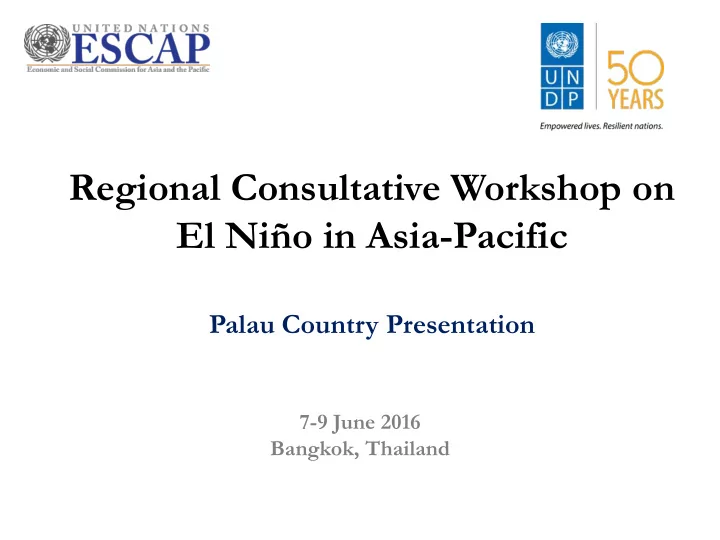

Regional Consultative Workshop on El Niño in Asia-Pacific Palau Country Presentation 7-9 June 2016 Bangkok, Thailand
El Niño Impact – Water System is not sufficient: Demand > Supply – Tank Storage Volumes and Dams for stream intake are small and not sufficient enough to supply stream shortfalls during dry periods – 4 out of 16 States depend on rain to recharge their groundwater sources and water lenses… INCREASED SALINITY – Increase Impacts on Health and Crops – Impact on Tourism (13,000 tourists per month)
Response Actions to El Niño • 21 March 2016: NEC (National Emergency Committee) recommends to the President • 22 March 2016: President issued Executive Order No 389 declaring the State of Emergency – Extreme Drought – 10 Days Period; Water Rationing and Conservation • 1 April 2016: State of Emergency Extension – Additional 10 Days period • 18 April 2016: In response to the continued drought condition, President Directive No 16-17 was signed; and directing the Executive Branch to continue responding to emergency situation… • 9 May 2016: Returned back to 24 Hours Water and Water Conservation Measures still hold
Challenges • Palau Public Utilities Corporation (PPUC) reported that the two water sources for the Koror- Airai Water System had been declining for the last few months and at that time one of the sources (Ngerimel Dam) had been shut down. The remaining source of water was from the Ngerikiil River, which produced only 750,000 gpd, 19% of the normal production of 3.8 million gpd. (Currently, the Ngerikiil River production is down to 500,000 gpd.) • PPUC reported that the water levels have been declining since January 2016. PPUC placed Koror and Airai on an Emergency Water Rationing Schedule on Saturday, March 12, 2016. At that time, the water rationing permitted five hours in the morning and five hours in the evening for all areas. • March 19, 2016, the water rationing was reduced to four hours in the morning and evening. • March 22, 2016, water rationing was further reduced to three hours in the morning and evening. (Two days later, rationing reduced provision of water to two hours in the morning and evening) • March 29, hamlets were divided into two groups, one receiving three hours of water in the mornings and the other receiving three hours of water in the evenings.)
Challenges • The Ngerimel Dam had been practically exhausted, to the extent that the few feet of water remaining had become stagnant and posed a health risk. Replenishing this water source would require a major effort to flush the reservoir and clean the debris of dead fish and other contaminants. • Due to the continuous decline in water, PPUC also reports that other parts of Babeldaob, including the 8 larger states are experiencing diminished water resources and have placed their communities on water rationing schedules. • The Ministry of Health (MOH) reported that the health impacts associated with the current drought could lead to disease outbreaks (diarrhea, pink eye, etc.), food and water borne illnesses and air quality related illnesses. MOH facilities continue to rely on the public water system to operate. • The Ministry of Education (MOE) reported that they had a 3-4 day onsite water storage, but also continue to rely on the public water system to refill their water storage. With the water rationing implemented by PPUC, MOE recognizes the increased risk to student health and hygiene. • According to Belau Tourism Association (BTA), average arrivals are nearly 13,000 visitors per month. With the water rationing implemented by PPUC, BTA is concerned that the level of water service may not be able to support that many visitors.
Support Required (next 6 months) 1. Appropriation from the Government of Palau: 2.1M USD 2. Government of Korea: $50K USD 3. Government of Taiwan: 16 Water Tanks 4. Government of Japan: 20 each Water Bladder 5. Government of Israel: Reverse Osmosis or Desalination Unit Long-Term Measures 1. Government of USA: $100K USD 2. Government of Japan: Water System with costs of 5M USD
Recommend
More recommend